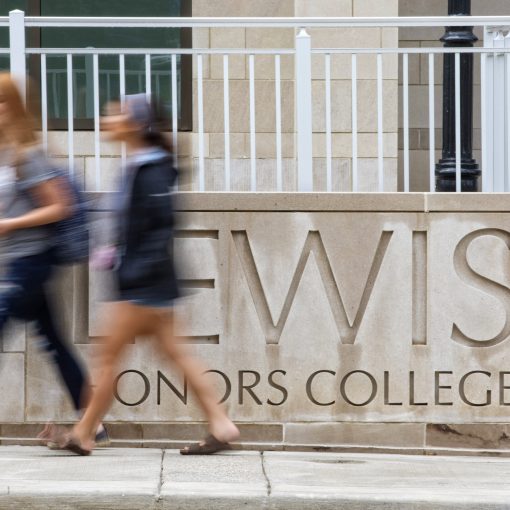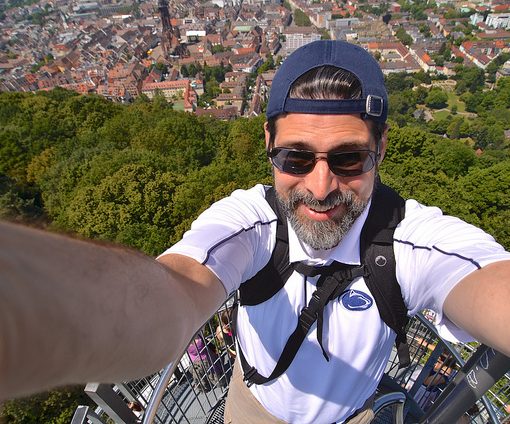Today the Centre Daily Times began a series of editorials to promote our inaugural “Shaping the Future Summit.” My piece is intended to set the tone and build interest and excitement in our upcoming summit. Check out all the exciting events culimatinating with our keynote speaker, Dr. Peter Diamandis: http://futuresummit.psu.edu
This year, April 1st is no joke! Come to the Summit!
Education is about the future.
This should be fairly obvious and it often is, especially when we consider the so-called STEM fields: science, technology, engineering and math. My colleagues in these fields are seeking solutions to challenges we face today in an effort to make our future more secure, healthier and equitable. But even those of us who study the past often do so with an eye toward a better understanding of the present and informing the future. Education, however, is far more than research and discovery. It is about forming, guiding and empowering our students. They are the embodiment of our future; they are our future.
Whatever we may invent or cure, whatever new fuel source we discover or debt that we accrue, it is our students who will benefit or bear the burden. For good and ill, the future is theirs. Education, particularly higher education, ought to be predicated upon preparing our students not simply to accomplish tasks but to think critically about the challenges that they will face. In order for them to fully apply their skills and talents developed in the academy, however, we must also present them with the proper questions. If they are to solve the challenges of the future, they must begin facing them now, in the present.
That is why the Schreyer Honors College has launched the Shaping the Future Summit. It is a yearlong series of events designed to highlight the challenges and opportunities that our students will face as the next generation of leaders, connecting the entire Penn State community with distinguished figures who are catalyzing political, economic and cultural change around the globe. The summit culminates with a closing keynote address by an international leader. This individual will share his or her vision for how the issue chosen as the summit’s focus will affect the world during the next two decades. Our focus for this year’s inaugural summit is “The Impact of Innovation.”
The challenges that we face often require the introduction of something new. That may be a new way of thinking, more efficient means of accomplishing a task or a discovery, bringing the world something truly new and never before seen. Innovation is seen by many as the key to all of the challenges set before us.
For example, there is enough food produced in the world so that no one need go hungry, yet we need innovative solutions for the preservation and distribution of the food. We also need breakthroughs in political relationships and financial concerns. Such optimists believe that these challenges are not insurmountable and are certainly within reach in the near future.
New ways of thinking and doing can also bring about unintended consequences.
Greg Lucier, a 1986 graduate of Penn State who is the chairman and CEO of Life Technologies, the sponsor of the summit, kicked off this year’s events with a presentation of the amazing advances in genetic and genomic research. He spoke about the ability to know with a great degree of certainty what genetic disorders we might have, before we develop any symptoms of illness. He also recognized the moral challenges that such technological innovation brings.
Should such procedures and potential future therapies only be available to those who can afford it? Should health insurance companies be allowed to require such testing of policyholders?
The impact of innovation is never solely benign. Yet we will need innovation and creative and critical thinking if we are to overcome the challenges before us. The summit events in the coming weeks include presentations about the future of energy and sustainability, a tour and demonstrations at Penn State’s GridSTAR Center in Philadelphia, a research fair, book discussions, and many opportunities for students to continue conversations about the summit themes.
The summit culminates April 1 with our inaugural speaker, Dr. Peter H. Diamandis, the commercial space pioneer, inventor and author of “Abundance: The Future is Better Than You Think.” He believes fervently that we possess all we need to provide a healthy and fulfilling life for everyone on this planet. We just need the creative and innovative thinking to unlock our potential.
Please join us at 8 p.m. in Eisenhower Auditorium for this free event, open to the public, and consider the impact of innovation and how we will shape the future.



